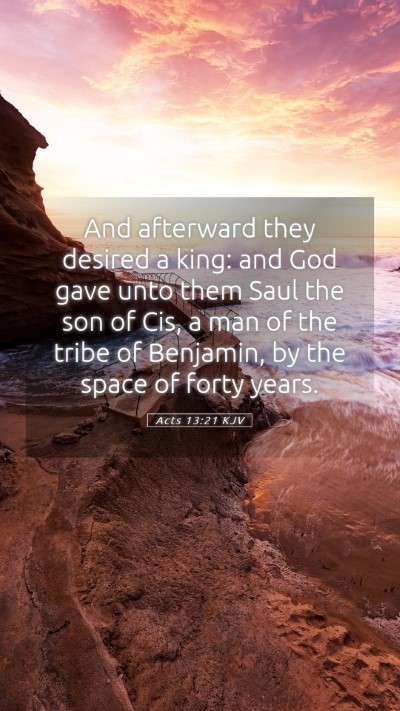Understanding Acts 13:21
Acts 13:21 states, "And afterward they asked for a king; and God gave them Saul the son of Kish, a man of the tribe of Benjamin, for forty years."
This verse is pivotal in recognizing the transition of Israel from a theocracy, where God ruled directly through prophets and judges, to a monarchy. The request for a king was motivated by the desire to be like other nations, reflecting a lack of faith in God’s sovereign leadership.
Bible Verse Meanings
This section discusses the meanings of Acts 13:21, enriched with insights from various public domain commentaries.
-
Matthew Henry Commentary:
Henry notes that the Israelites' desire for a king was not in itself wrong, but it stemmed from a misplaced trust in human leadership rather than reliance on God. This desire showcases a recurring theme in Scripture where God’s people gravitate towards worldly structures instead of divine guidance.
-
Albert Barnes' Notes:
Barnes emphasizes the significance of God permitting Israel to have a king despite their rejection of His authority. This sets a precedent for God’s patience and willingness to work through human institutions, even when they often lead to unfaithfulness.
-
Adam Clarke Commentary:
Clarke delves into the historical context surrounding the establishment of kingship in Israel. He highlights Saul’s character and how, although chosen by God, he ultimately faltered under the burden of leadership, illustrating the complexities of following human authority versus divine will.
Scripture Analysis
To truly grasp the insights within Acts 13:21, consider the broader narrative of Israel's history as presented in Scripture.
-
Thematic Overview:
The request for a king signifies a crucial turning point for Israel, moving from divinely appointed leaders to human sovereignty. This transition sets the stage for the various kings who ruled, demonstrating both the liberty and limitations of human leadership.
-
Historical Context:
Understanding the historical setting of the Israelites during this period is essential for Bible study insights. The surrounding nations had monarchs, and Israel desired a similar structure for national identity and unity.
Bible Study Insights
This analysis can be vital for Bible study groups seeking to delve into the complexities of leadership as discussed in Acts 13:21.
Key Applications:
- Recognizing the balance between divine authority and human leadership in today’s context.
- Learning to trust in God’s sovereignty over worldly systems.
- Reflecting on the consequences of straying from God's ways in favor of human decisions.
Meaning of Bible Verses
Acts 13:21 serves as a reminder of the challenges involved in discerning God’s will amid societal pressures. It encapsulates the struggle between faith and conformity. Engaging with this text allows for a deeper understanding of the human condition and the spiritual implications of leadership.
Understanding Difficult Bible Passages
This verse opens discussions about the difficult balance of understanding God's permissive will versus His perfect will. It can facilitate conversations on how believers navigate the complexities of leadership, both personally and within broader communities.
Cross References
Acts 13:21 relates to several other scripture references including:
- 1 Samuel 8:7-9 - God's warning against Israel's desire for a king.
- 1 Samuel 10:1 - The anointing of Saul as the first king of Israel.
- 1 Samuel 15:11 - God's regret over making Saul king due to his disobedience.
Conclusion
Understanding Acts 13:21 involves an examination of Israel's request for a king in the context of their relationship with God. This lesson resonates throughout history and invites believers to reflect on their own trust in divine leadership versus human authorities. Engaging deeply with this passage not only enriches biblical exegesis but also informs personal application of Scripture to daily life.
For those leading Bible study lessons, discussions on this verse can incorporate various angles—historical, theological, and practical—promoting robust and meaningful engagement with scripture.


